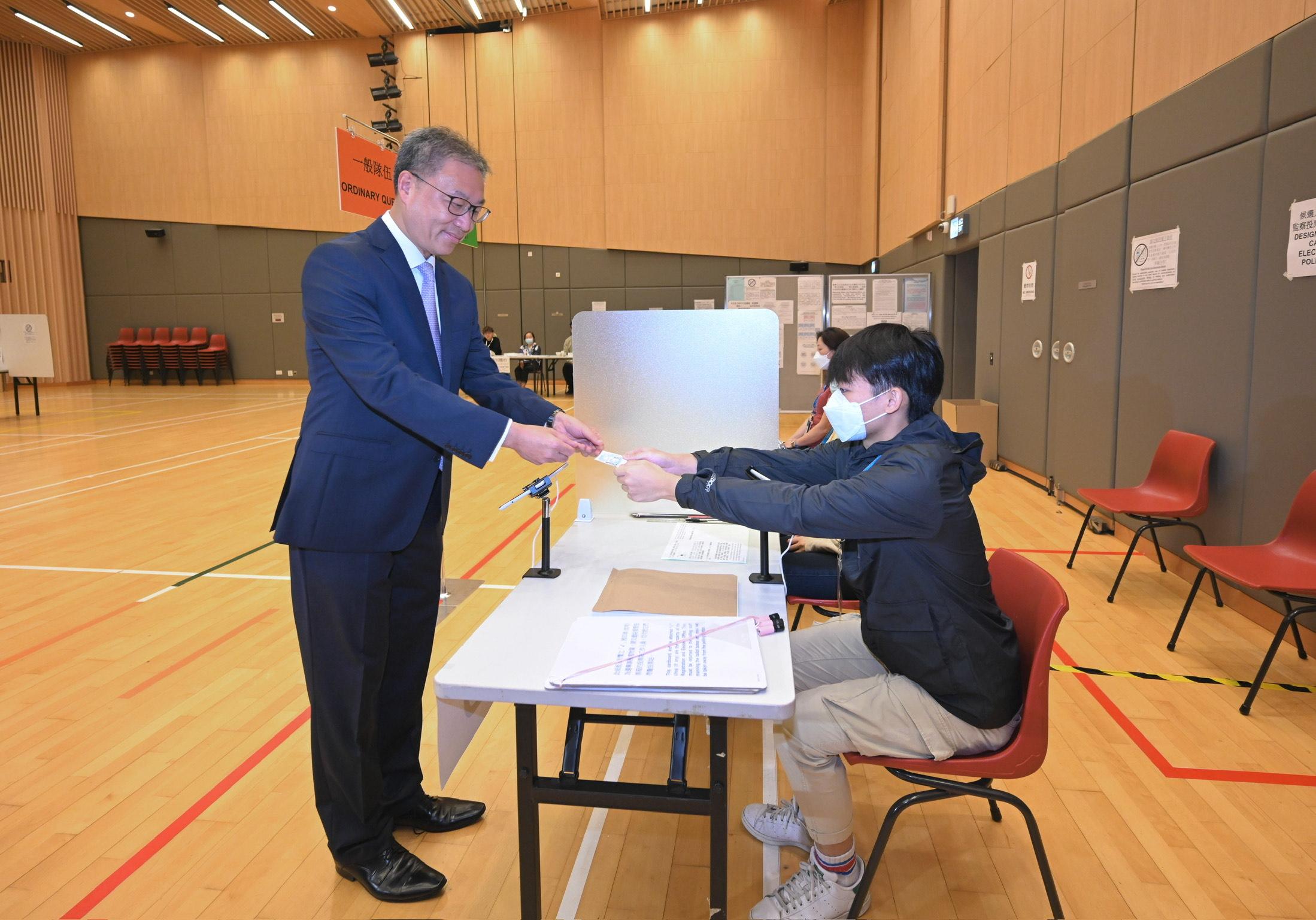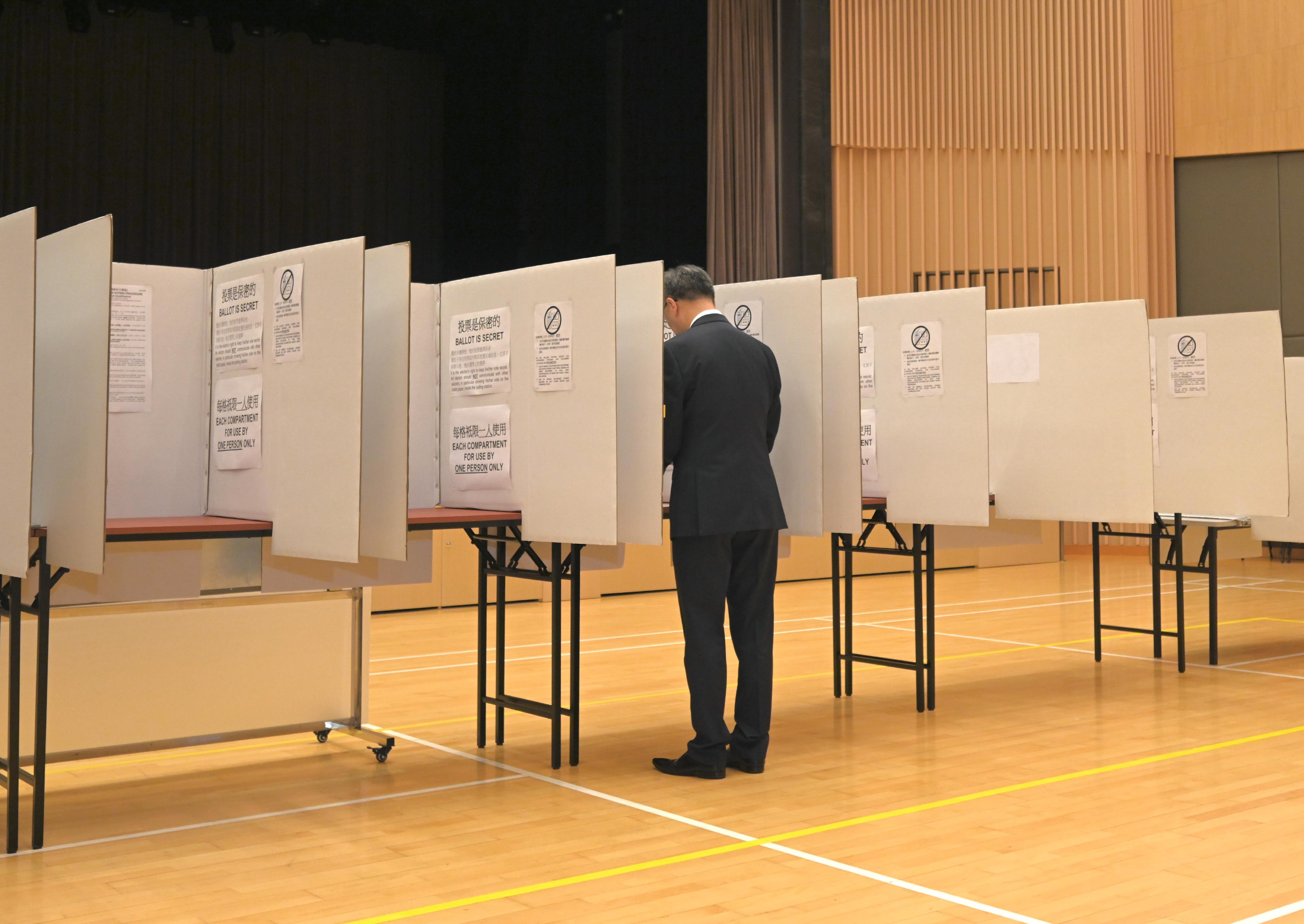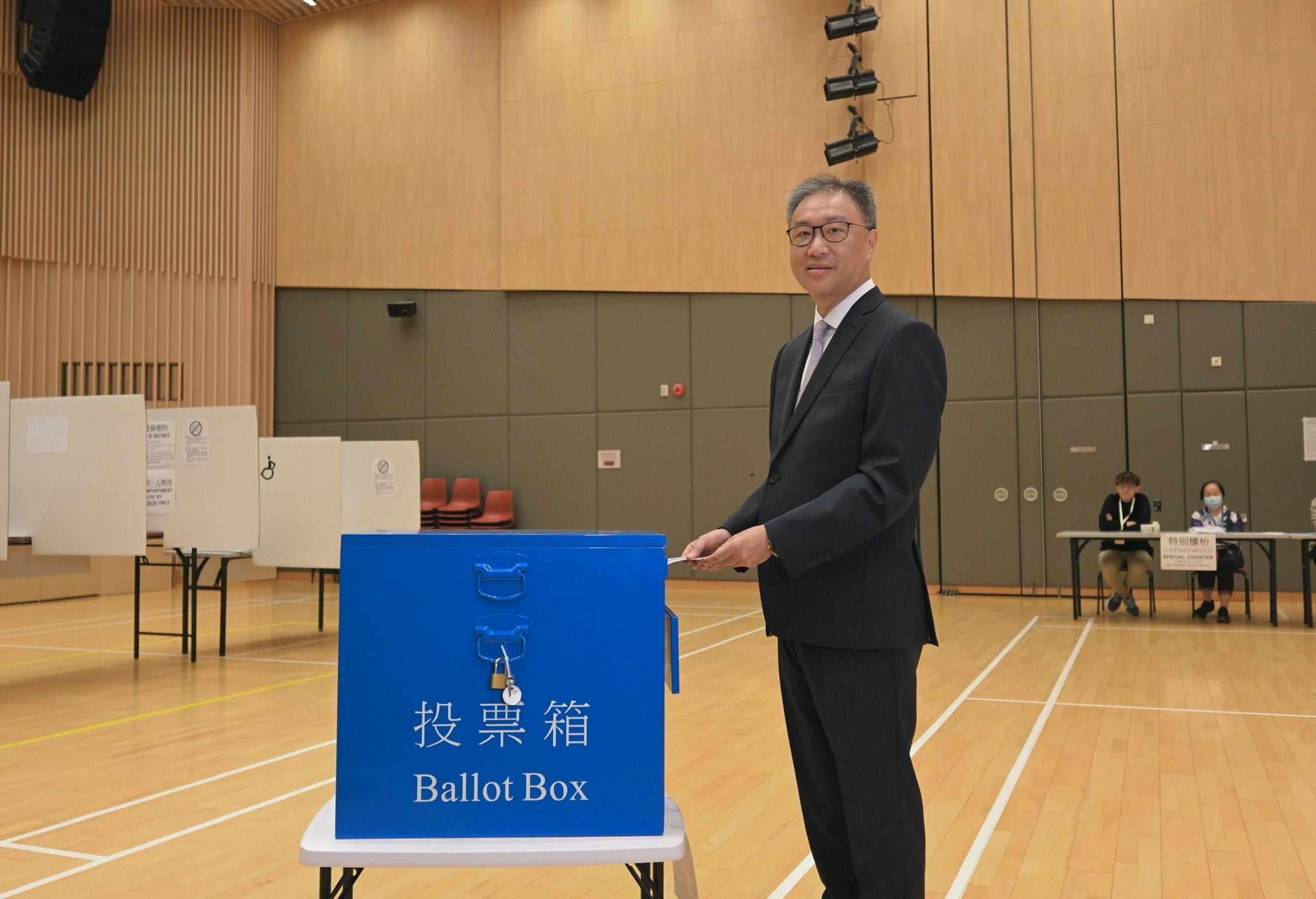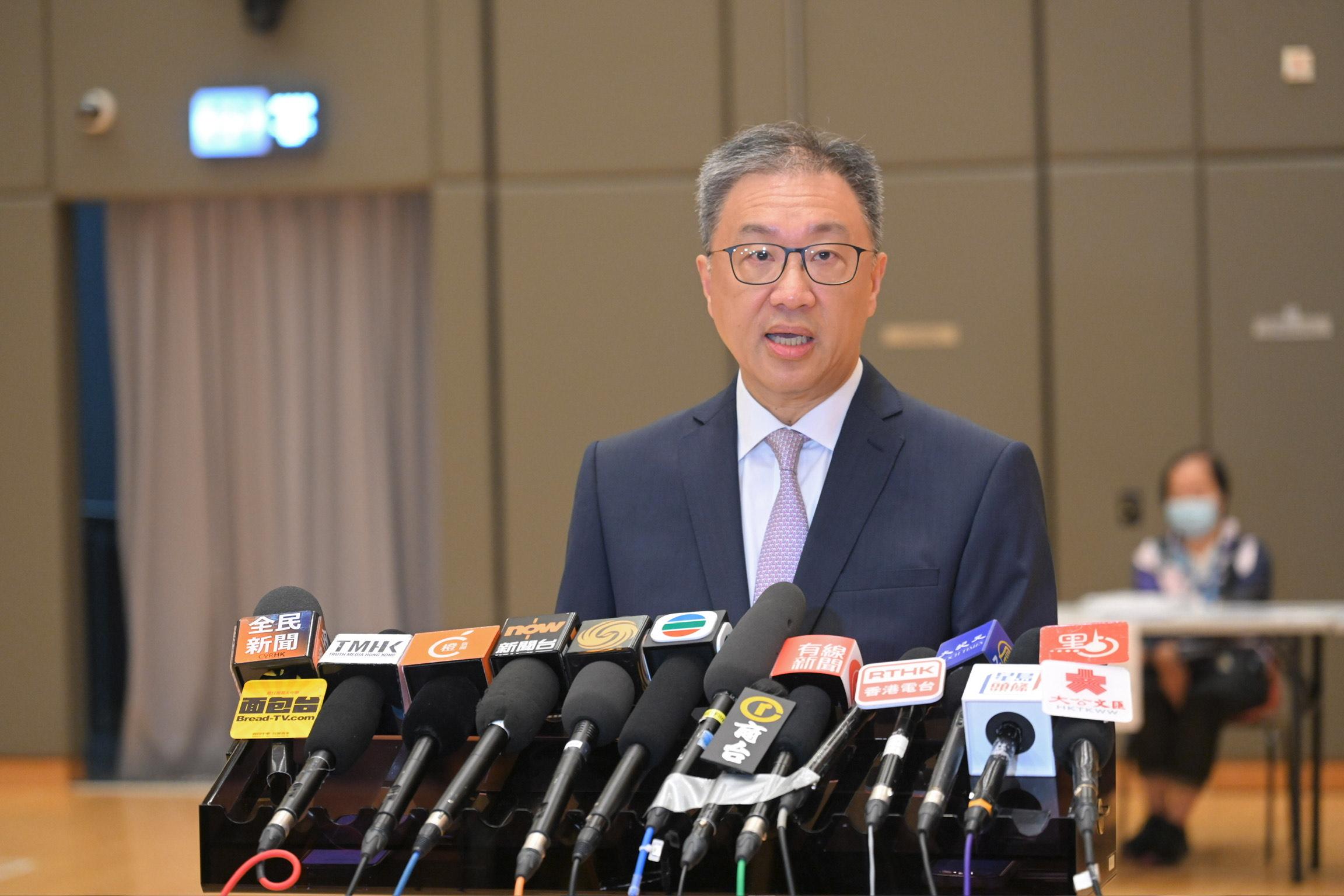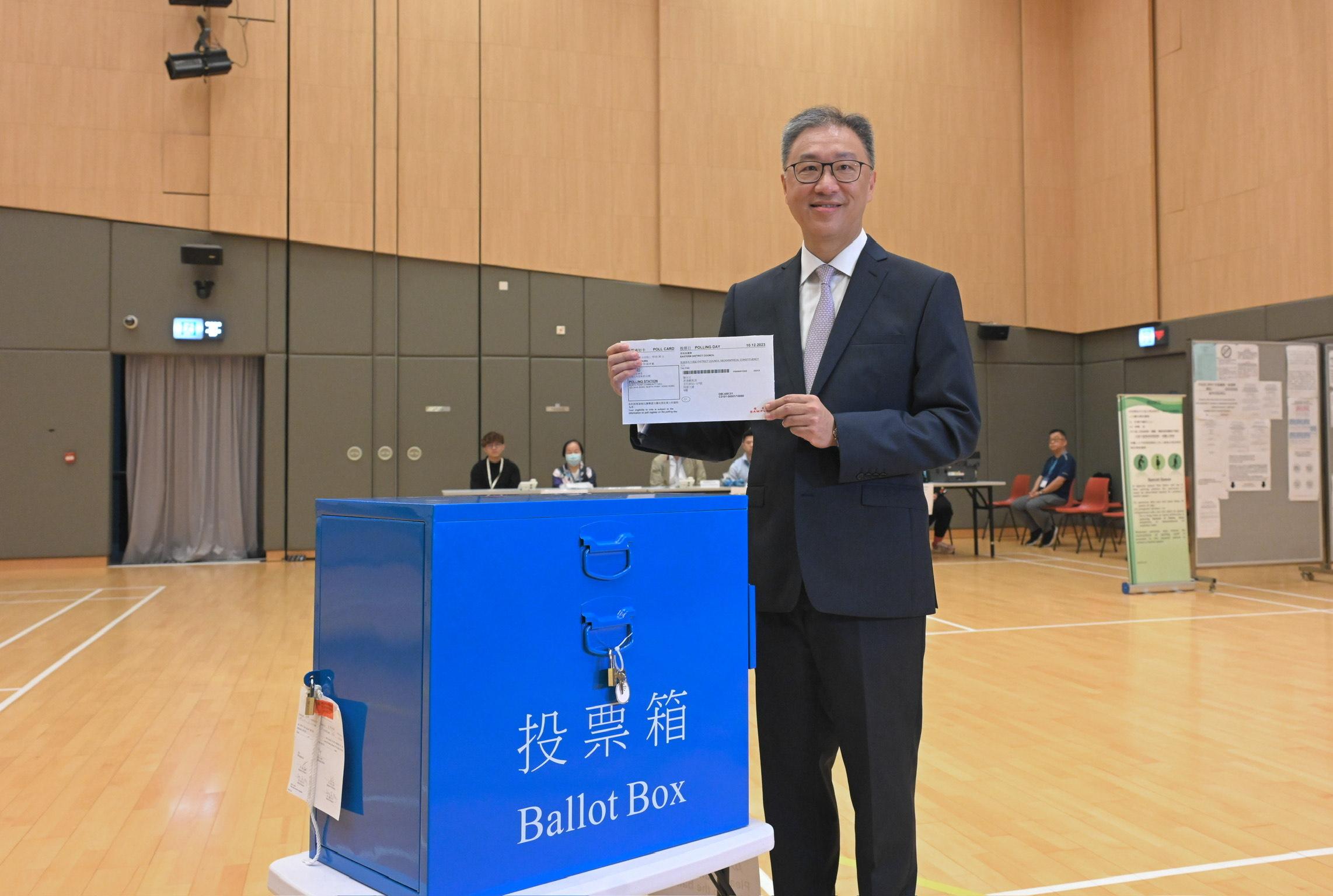The following is issued on behalf of the Electoral Affairs Commission:
The Chairman of the Electoral Affairs Commission (EAC), Mr Justice David Lok, today (December 5) visited a mock polling station at the North Point Community Hall and called on electors to exercise their civil rights to vote and to follow proper voting procedures in the 2023 District Council Ordinary Election (DCOE) to be held this Sunday (December 10).
Mr Justice Lok said, "The preparatory work for the District Council Election has reached the final stage. The EAC and the Registration and Electoral Office (REO) are making the final sprint to ensure a smooth polling and counting process. For the District Council geographical constituency (DCGC) election, 171 candidates will contest 88 seats in 44 constituencies. As for the District Committees constituency (DCC) election, 228 candidates will contest 176 seats in 18 constituencies."
He reminded electors that they must bring their original Hong Kong identity (HKID) card to the designated polling station as specified on their poll card to vote. An elector may vote only at the polling station allocated to him/her. Electors who have yet to receive the poll card can log in to the Online Voter Information Enquiry System (vr.gov.hk) to check their elector status, as well as polling information such as the name and address of the designated polling station. They may also call the election hotline at 2891 1001 for enquiries.
The mock polling station at the North Point Community Hall is one of four mock polling stations open for electors to familiarise themselves with the polling procedures for the DCOE. The other three are at the Kwun Tong Community Centre, the Tai Po Community Centre and the Tseng Choi Street Community Hall in Tuen Mun. The mock polling stations will be open from today until Friday (December 5 to 8). Today's opening hours are from 4pm to 8pm, and they will be open between noon and 8pm from tomorrow (December 6) until Friday. A hotline at 2967 0367 and a fax line at 2834 0934 have been set up to arrange appointments for group visits.
Polling stations and polling hours
"The REO will set up over 600 DCGC ordinary polling stations (OPSs) for about 4.33 million registered electors to vote. The polling hours for the OPSs and the dedicated polling stations set up at police stations will be the same from 8.30am to 10.30pm. For the dedicated polling stations set up at penal institutions, for security reasons, the polling hours will be from 9am to 4pm for the imprisoned or remanded electors to vote," Mr Justice Lok said.
"There will be one DCC polling station each in the 18 districts for about 2 500 DCC electors to vote. The polling hours for the DCC polling stations will be from 8.30am to 2.30pm," Mr Justice Lok added.
"DCC electors should have received two poll cards with a prominent message printed on the DCC envelope of the poll cards, reminding them of the need to cast their DCC and DCGC votes at two different polling stations with different polling hours."
To enable electors living on the Mainland or those who need to travel to and from the Mainland to cast their DCGC votes, the REO will set up four Near Boundary Polling Stations (NBPSs) at two secondary schools in the vicinity of Sheung Shui MTR Station. To cast their votes at the allocated NBPS at the specified timeslot on the polling day, electors are required to register through the online registration system in advance before the deadline of 6pm today. Upon successful registration, they will receive a notification of registration result sent by the REO via SMS and email (if applicable). Electors registered to vote at the NBPSs can ignore the polling station information printed on the poll card if they have received the notification of registration result sent to them by the REO via SMS and email (if applicable).
Mr Justice Lok said that the voting arrangement is only applicable to DCGC electors but not DCC electors. DCC electors on the Mainland should plan their return trips to Hong Kong as early as possible so that they can cast their votes on the polling day.
Polling procedures
"Most OPSs and DCC polling stations will make use of the Electronic Poll Register (EPR) system to issue ballot papers. The polling procedures are very simple. Electors will be instructed by the polling staff to one of the issuing desks after they enter the polling stations. Electors must show the original of their HKID cards and the polling staff will scan the elector's HKID card with an EPR tablet. The elector may check his/her name and partial HKID card number to ensure the accuracy of the issuance of ballot paper. The elector will then enter the voting compartment upon collection of the ballot paper," Mr Justice Lok said.
"DCGC electors must use the chop provided by the polling stations to stamp a tick on the ballot paper in the circle opposite the name of the candidate of their choice by themselves, and then insert the unfolded ballot paper into the blue ballot box with the marked side facing down. Each elector can only stamp one tick on the ballot paper for one candidate of their choice (i.e. there can only be one tick marked on the ballot paper) or the ballot paper will be deemed as invalid.
"For the DCCs, electors must use the black pen provided by the polling stations to fill in the ovals opposite the names of the candidates of their choice. Electors must vote for no more or no less than the number of vacancies for that DCC, otherwise the ballot paper will be deemed as invalid and will not be counted.
"Ballot paper checking system will be set up at DCC polling stations for electors to check whether the number of candidates marked on the ballot paper is correct. The ballot paper checking system will neither record nor count the electors' choices on the ballot papers. Having checked the ballot paper, electors should insert the unfolded ballot paper into the white ballot box with the marked side facing down."
To ensure that electors understand the polling procedures, the REO has produced a set of TV and radio Announcements in the Public Interest which have been uploaded onto the dedicated election website (www.elections.gov.hk) for electors' reference.
Queuing arrangements
"Same for the public elections in recent years, two queues will be set up at the polling stations for this election. The special queue will be for persons aged 70 or above, pregnant women and persons with disabilities; while another one for the ordinary electors. Seats will be provided in the polling stations for any electors in need, and to join the queue afterwards for collecting their ballot papers," Mr Justice Lok said.
On the polling day, electors can check the approximate waiting time of each OPS on the dedicated election website. Relevant signage will also be placed outside the polling stations for electors' reference. Depending on their schedule, electors can make their own arrangements to vote or choose to vote when fewer electors are waiting.
Points to note in the polling stations
The ballot is autonomous and secret. Electors must mark their ballot papers on their own in the voting compartment. If in need, electors may ask for assistance from the polling staff. Electors must not disturb others during voting, nor use electronic communication devices, take photographs or make audio recordings or video in the polling stations. Canvassing, distribution of election advertisements or displaying propaganda materials are also prohibited inside polling stations.
Counting and result announcement
For DCGCs, except for small polling stations and dedicated polling stations, polling stations will be converted into counting stations and counting will take place at the same venue.
For DCCs, after the close of polls, the polling staff will ensure that the locked and sealed ballot boxes will not be interfered with, and the counting of votes will only commence until the close of polls for the DCGCs in order to avoid any possible impact to the election results for the DCGCs due to the early announcement of election results for the DCCs.
"Members of the public, including the media, have the right to observe the count inside the public area of the counting station. Photographing and/or video-recording is also allowed in the public area of the counting station. A notice setting out the maximum capacity of the public area will be displayed outside each counting station," Mr Justice Lok said.
The results will be uploaded onto the dedicated election website and published in the form of a press release.
Clean elections
Mr Justice Lok reminded that according to the latest amendments to the Elections (Corrupt and Illegal Conduct) Ordinance (Cap. 554), it is illegal conduct to incite any person not to vote, to cast a blank or invalid vote by any activity in public during an election; and it is corrupt conduct if a person willfully obstructs and prevents another person from voting at an election. In addition, the polling staff will report to law enforcement agencies if any person is suspected to have queued up repeatedly or used other ways to obstruct others from voting.
For enquiries, please call the REO's hotline on 2891 1001 or visit the dedicated election website for more information on the election.
Follow this news feed: East Asia






